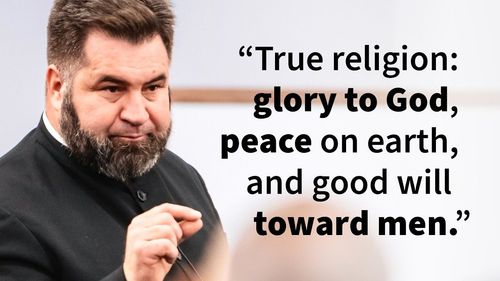GOD IS INFINITELY, ETERNALLY, AND INFLEXIBLY HOLY. To this the Scriptures testify again and again. “The Lord is righteous in all his ways, and holy in all his works” (Psalm 145:17), and again, “God reigneth over the heathen: God sitteth upon the throne of his holiness.” Psalm 47:8. “Who is like thee, glorious in holiness, fearful in praises, doing wonders?” Exo. 15:11.
Both the prophet Isaiah and the Apostle John described visions of the Almighty sitting upon a throne of awful splendor and surrounded by living creatures who were so overcome by the wonders of His holiness that they could only exclaim in unceasing reverence, “Holy, holy, holy!” (Isaiah 6:1-5; Rev. 4).
It was God’s holiness that drove Adam and Eve from the Garden of Eden. It was God’s holiness that destroyed nearly the entire world of Noah’s day, wiping it clean of unrighteous men. Again, it was God’s offended holiness that spilled over in flaming wrath to consume the wicked cities of Sodom and Gomorrha. So great was God’s holiness, that it compelled Moses to remove the shoes from off his feet before approaching the burning bush. So terrible was His glory revealed at Mount Sinai, that it caused Israel to quake and tremble, keeping a respectful distance from the mountain for fear of losing their lives.
This same presence, in multiplied power and glory, is what we must meet when we come face to face with holiness at the Judgment bar of God.
God has never tolerated unholiness. When He separated to Himself a people in the Old Testament, God gave them very specific, detailed instructions of how they ought to live, and He instituted definite consequences for those who would offend. “Ye shall be holy,” He warned, “for I the Lord your God am holy.” Lev. 19:2. The punishment for disobeying God’s law was serious. More than one individual who took God’s holiness lightly was killed on the spot (see Lev. 10 and 2 Sam. 6).
Scripture says of God, “Thou art of purer eyes than to behold evil, and canst not look on iniquity.” Hab. 1:13. Impurity is to Him so repugnant that He must turn His eyes away. Each sin is a stink in His nostrils, and He will not overlook a single transgression of His law. While He bears with the sinner and while His mercy pleads with sinners to turn from their course, His wrath is building up a store of judgment which, as a cup filled drop by drop, will eventually overflow.
“For thou art not a God that hath pleasure in wickedness: neither shall evil dwell with thee. The foolish shall not stand in thy sight: thou hatest all workers of iniquity. Thou shalt destroy them that speak leasing: the Lord will abhor the bloody and deceitful man.” Psalm 5:4-6.
A man cannot possibly sin against a holy God and not be affected in his relationship with God. Hebrews tells us Christ is “holy, harmless, undefiled, separate from sinners.” Heb. 7:26. Clearly, there is an antagonism between God and sin which makes fellowship between God and sinners impossible. We read in Isaiah, “But your iniquities have separated between you and your God, and your sins have hid his face from you, that he will not hear.” Isaiah 59:2.
Sin stood between these people and God. It put a gulf between them, so great that He hid His face from even hearing them. Just as Adam, by one sin, found himself cut off from communion with God in the garden, the soul who sins but once–no matter how high his religious profession–is out of harmony with His Maker and unable to live in peace with Him either in this life or in eternity.



